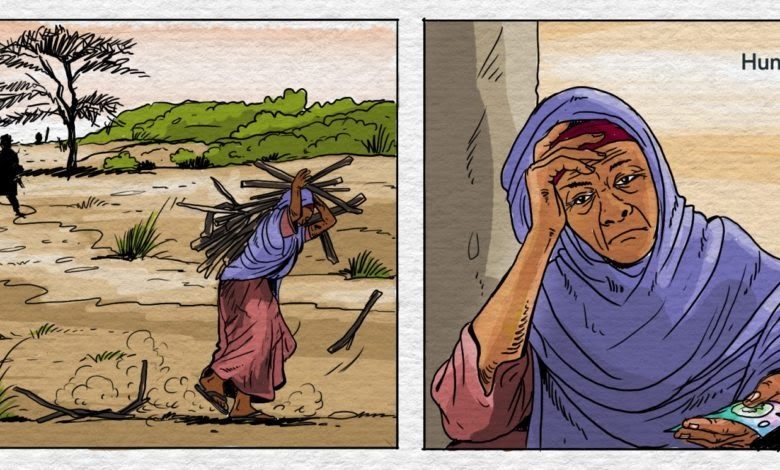IDP Diaries: ‘Women Walk In Groups To Protect Themselves From Attacks’
Displaced women in Borno state have come up with a way to protect themselves - walk in groups everywhere they go. The intricacies of this tactic is explained in this diary.

Why do we move in large crowds whenever we want to go to the farm? Boko Haram can attack us irrespective of our numbers; moving in large groups is only to comfort ourselves and show solidarity rather than protect ourselves.
We are not armed, so we cannot do anything other than pray and make the journey back and forth every day to the farms. Another reason you see these large numbers of women and girls going to the fields is; we have to gather at the gates of IDP camps or communities before going to the forest since there are military officers and Civilian Joint Task Force (CJTF) at the gates.
If you get up in the morning and plan to go to Bama from Maiduguri, they won’t let you out or move until they open the gate at about 9 a.m. The same applies to the farm, so moving in groups in the morning and evening before the gates are opened and closed is not only for our safety but to not get locked out. Those who slept in the bush at night because gates were closed experience one form of sexual violence or the other.
Not all of these women go to their farms. Many work as day labourers to find what to eat because of inadequate food assistance in IDP camps. Some would plant groundnuts, while others would offer “galgala” (daily labours) on other people’s farms. You labour for them and they pay you N200 or N300 since the food provided at the IDP camp in Bama is insufficient.
Everyone, mostly women, will congregate around the gate, and when it is opened, everyone will flee until they reach the military gate. If military officers find you without a pass in your hand or the receipt isn’t signed, they will block you from passing through. This is why we assemble ourselves, wait, then show our pass to avoid being stopped ahead.
When girls stray or are locked out after missing deadlines for curfews, the risk of sexual violence is high.
Why are there more women than men in the large procession? There are more women than men in IDP camps and even in communities, if you check. The men are either dead or detained by the military; the few are probably too afraid to go out for fear of being attacked by either side of the conflict. Women are rarely killed like men; what women face the most is sexual violence.
(Additional reporting by Fatima Bukar and Yakura Kumshe)
Note: IDP Diaries is a first-person account by the subject themselves. The account has been translated for reading by HumAngle.
This is a multiple-part series; click here to read other IDP Diaries.
This report is a partnership between HumAngle Media and Premium Times Center for Investigative Journalism (PTCIJ) under the ‘Accountability Journalism & Investigative Reporting for Deepening Democracy and Development’ project.
Support Our Journalism
There are millions of ordinary people affected by conflict in Africa whose stories are missing in the mainstream media. HumAngle is determined to tell those challenging and under-reported stories, hoping that the people impacted by these conflicts will find the safety and security they deserve.
To ensure that we continue to provide public service coverage, we have a small favour to ask you. We want you to be part of our journalistic endeavour by contributing a token to us.
Your donation will further promote a robust, free, and independent media.
Donate HereStay Closer To The Stories That Matter




